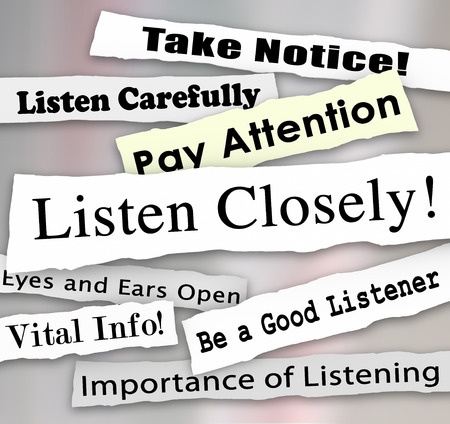
Listen Closely.
A colleague recently relayed to me a story that floored me, to say the least.
Real World Story: My husband recently passed away, and I had the daunting task of having to move and cancel and transfer various utilities and home services. Unfortunately, many of our accounts were under his name only. When I called DIRECTV to cancel our Internet and TV service, I was flabbergasted by what the customer service agent asked me to do.
“I would like to cancel my account effective December 1 because I am moving. The account is under my husband’s name, but he recently passed away,” I explained.
“I’m sorry that you want to cancel service. You know that you can transfer your service to wherever you are moving, right? May I have your account information?”
I gave the agent the account information. He then said, “I see you are not the account holder. May I talk to Robert?”
“I wish you could. He died last month,” I replied in mild horror.
When I dealt with the many other utility and home service companies, I was given sincere-felt condolences and treated with extra care. Those customer service experiences were exceptional and left me a lot less burdened and stressed.
Strategies that Turn it Around:
- Listen with purpose. In customer service, we handle recurring issues. However, we must keep in mind that every customer is coming from very different circumstances. Many issues may be the same and recurring but customers are not. Therefore, we must always listen with intent and purpose and without interruption. Before anything else, we must understand exactly from where each customer is coming and what that customer’s individual needs are.
- Formulate a reply ONLY after you have listened. It is human nature to begin formulating answers to problems well before we know exactly what the customer is saying, needing or wanting. We may already know an answer to a common issue, but we certainly don’t know the customer who is calling. His or her issue will have caveats that are intrinsic to his or her particular situation. Listen first and then formulate a reply that is individual to the person calling, writing or standing in front of you.
- Always remain flexible. If a customer tells us that his or her spouse has died, show sympathy and extra care. If a customer has gone through a crisis like a natural disaster, then we need to be well aware that the customer is already in distress. We must adapt to each individual customer in order to be truly helpful.
Remember: We may face the same customer service issues many, many times during any given day. However, every single customer whom we come into contact with will have individual needs and wants. We must learn first to listen with purpose before we formulate a solution. And we must always remain flexible in order to provide the best possible service to every single customer.
What do YOU do to ensure you listen to each and every customer? Please share your comments and stories.

